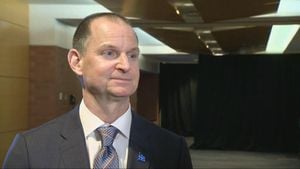The issue of electoral boundary redistricting is increasingly becoming a hot topic across Canada and the United States, highlighting significant political challenges and community sentiments. This matter is particularly relevant as new boundaries are set to be implemented for upcoming elections, affecting representation across various regions.
The controversial redistricting process has led to legal challenges, political maneuvering, and concerns among constituents about their representation. For example, Jaime Battiste, the Liberal MP for Sydney-Victoria, recently faced difficulties with proposed changes to his riding boundaries. Last year, the federal electoral boundaries commission suggested altering the district, excluding the Eskasoni and Wagmatcook First Nations, and renaming it to Sydney-Glace Bay. Battiste’s attempt to challenge these changes legally failed, prompting him to announce his candidacy for the new riding, which comprises about 10,000 more individuals than before, totaling just over 82,000 residents.
Battiste, who has served as MP since his election in 2019, raised concerns about the unconstitutional nature of the boundary changes, particularly as they relate to treaty rights and the Indigenous Peoples' rights as outlined by the United Nations Declaration on the Rights of Indigenous Peoples. Despite losing the court bid, he remains committed to representing his constituents. Battiste indicated his intention to contest for election again, citing the presence of about three-quarters of his current constituents being retained within the new boundaries.
Across the border, similar concerns arise as various states undertake their own redistricting processes. One such case involves Paul Wikstrom, the GOP candidate for House District 40B. He recently contested the residency of Democrat Curtis Johnson, who he alleges does not actually reside within the district he was elected to represent after claiming nearly two-thirds of the votes. If Wikstrom's challenge is upheld, it may lead to significant ramifications for the House's control, especially since the chamber is currently evenly split between Democrats and Republicans for the first time since 1979.
Wikstrom’s allegations are based on Minnesota law requiring candidates to reside within their districts for at least six months prior to the election. Johnson, who was previously a board member for Roseville Area Schools, had been under scrutiny throughout his campaign for his light residential ties. He owned property outside of the district and had started renting an apartment within it just before the election, which has now posed questions about the legitimacy of his election results.
Interestingly, political disputes about residency and boundary changes often surface during election periods, reflecting the contentious nature of political representation. The legal tussles surrounding both Battiste and Johnson illuminate the broader tensions and discomfort many voters feel about the integrity and fairness of their representatives.
While these disputes carry significant weight, the public's input and sentiments must also be considered during the redistricting process. The community dynamics play a pivotal role, especially as redistricting has the potential to alter representation drastically. It is not merely about geographical boundaries but about ensuring fair representation reflective of the populations within them.
Essentially, the subject of electoral boundary redistricting continues to provoke discussion and litigation as parties strive to navigate the complex interplay of political strategy, representation, and community need. The outcomes of these litigations and political strategies not only impact those directly involved but also resonate with voters who seek equitable representation in their respective regions.
Looking forward, voters are left to wonder how these changes will shape the political landscapes they reside within. Are their needs being met? Will their voices be heard? These questions loom large as electoral boundaries are redrawn and political battles ensue, potentially redefining governance at multiple levels.



